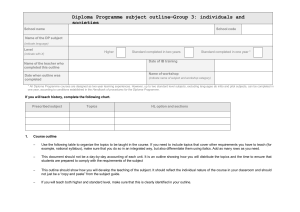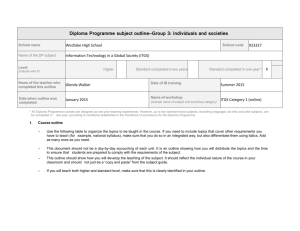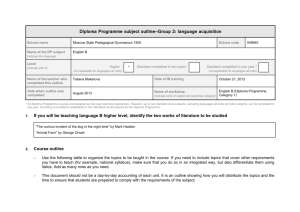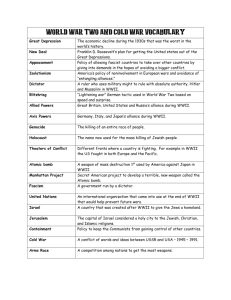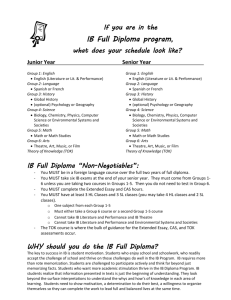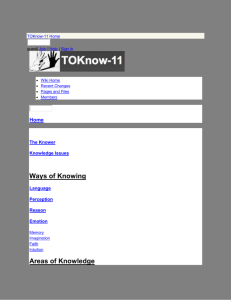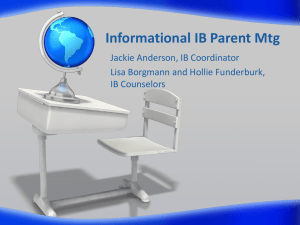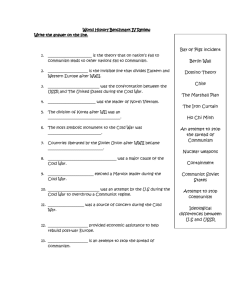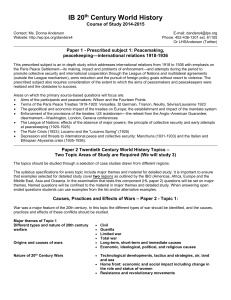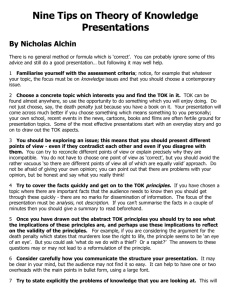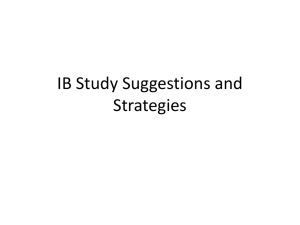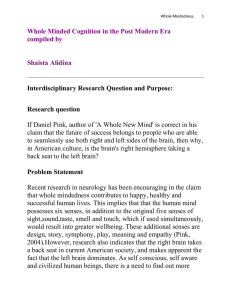indicate name of subject and workshop category
advertisement
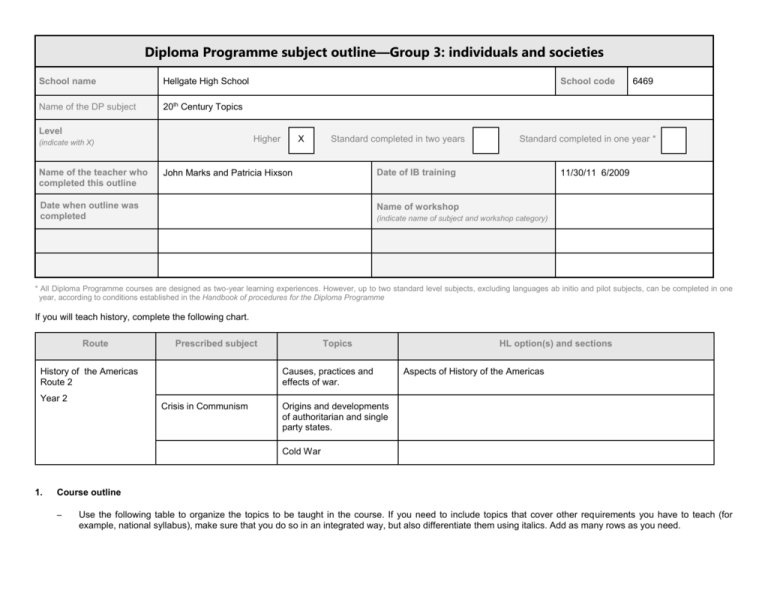
Diploma Programme subject outline—Group 3: individuals and societies School name Hellgate High School Name of the DP subject 20th Century Topics Level Higher (indicate with X) Name of the teacher who completed this outline School code X Standard completed in two years Standard completed in one year * Date of IB training John Marks and Patricia Hixson Date when outline was completed 6469 11/30/11 6/2009 Name of workshop (indicate name of subject and workshop category) * All Diploma Programme courses are designed as two-year learning experiences. However, up to two standard level subjects, excluding languages ab initio and pilot subjects, can be completed in one year, according to conditions established in the Handbook of procedures for the Diploma Programme If you will teach history, complete the following chart. Route Prescribed subject History of the Americas Route 2 Year 2 Topics Causes, practices and effects of war. Crisis in Communism HL option(s) and sections Aspects of History of the Americas Origins and developments of authoritarian and single party states. Cold War 1. Course outline – Use the following table to organize the topics to be taught in the course. If you need to include topics that cover other requirements you have to teach (for example, national syllabus), make sure that you do so in an integrated way, but also differentiate them using italics. Add as many rows as you need. – This document should not be a day-by-day accounting of each unit. It is an outline showing how you will distribute the topics and the time to ensure that students are prepared to comply with the requirements of the subject – This outline should show how you will develop the teaching of the subject. It should reflect the individual nature of the course in your classroom and should not just be a “copy and paste” from the subject guide. – If you will teach both higher and standard level, make sure that this is clearly identified in your outline. Topic/unit (as identified in the IB subject guide) Contents Allocated time Assessment instruments to be used One class is 50 minutes. In one week there are 5 classes. State the topics/units in the order you are planning to teach them. Year 1 Resources List the main resources to be used, including information technology if applicable. Topic/unit Contents (as identified in the IB subject guide) Allocated time One class is 50 minutes. In one week there are 5 classes. State the topics/units in the order you are planning to teach them. Year 2 Origins and development of authoritarian and single party states Causes, practices and effects of war. -The rise of communism in China/Mao and Russia/Stalin 2. 18 hours -The rise of fascism in Europe (Mussolini, Hitler) 18 hours World Wars I and II 22 hours Select colonial wars 10 hours th Assessment instruments to be used Resources List the main resources to be used, including information technology if applicable. Old IB exams Internet resources Analysis of primary source documents Primary sources textbook Essay format on a biweekly basis Oral presentations Late 20 Century wars 8 hours The Cold War Iron Curtain, Containment, Truman Doctrine, East and West Germany, UN, NATO, Warsaw Pact, Post WWII colonial conflicts, treaties, Détente and the Fall of the Soviet Union. 22 hours Year two Prescribed Topic Communism in crises 15 hours IB internal assessment requirement to be completed during the course Briefly explain how and when you will work on it. Include the date when you will first introduce the internal assessment requirement, when the internal assessment requirement will be due and how students will be prepared to do it. 3. Links to TOK You are expected to explore links between the topics of your subject and TOK. As an example of how you would do this, choose one topic from your course outline that would allow your students to make links with TOK. Describe how you would plan the lesson. 4. Topic Link with TOK (including description of lesson plan) 20th Century Topics Looking at history from multiple perspectives, using primary sources, classroom discussion, student presentations and lesson design to challenge their views on historic events. International mindedness Every IB course should contribute to the development of international mindedness in students. As an example of how you would do this, choose one topic from your outline that would allow your students to analyse it from different cultural perspectives. Briefly explain the reason for your choice and what resources you will use to achieve this goal. 5. Topic Contribution to the development of international mindedness (including resources you will use) Cold War The topics and subjects are all international in scope. The study of the Cold War will help students to understand the interconnectedness of world events. Development of the IB learner profile Through the course it is also expected that students will develop the attributes of the IB learner profile. As an example of how you would do this, choose one topic from your course outline and explain how the contents and related skills would pursue the development of any attribute(s) of the IB learner profile that you will identify. Topic Contribution to the development of the attribute(s) of the IB learner profile The Second World War and post-war modern Europe. Encouraging class discussion. Seminar style class structure where students assume the role of the teacher. Inquirers: Students will show independence in researching and evaluating materials outside the classroom setting. Knowledgeable: Students will gain in-depth knowledge of the impact of WWII on social and economic development of Modern Europe. Balanced: Students will look at the conflict of WWII from multiple perspectives ie: Soviet and Chinese contributions to the war. This will give students a broader understanding of the multiple motivations and contributions of various participents. 6. Resources Are instructional materials and other resources available in sufficient quality, quantity and variety to give effective support to the aims and methods of the courses? Will students have access to resources beyond the ones available at school? Briefly describe what plans are in place if changes are needed. Classroom set: Pearson 1. 2. 3. 4. Paper 1 Cold War Origins and Development of Authoritarian and Single Party States Causes, practices, and effects of Wars Classroom set: Howard Zinn, A People’s History of the United State. New York: Haprer, 1999 (For Hiroshima, and Legacy of WWII) 1 Per IB Teacher: J. Westwood, Endurance and Endeavour: Russian History 1812—1980, London: Oxford, 1973 Margaret MacMillan, Paris, 1919: Six Months That Changed the World, New York: Random House, 2002 Mitchner and Tuffs, Global forces of the Twentieth Century: Totonto: Reidmore Books, 1999 Adam Hochschild, To End All Wars: Macmillan, 2011 Neil DeMarco, The World This Century: Working With Evidence. London: Collins, 1987 20th Century World History Course Companion, New York: Oxford, 2009 John Keegan, the Second world War. New York: Viking, 1989David Remmick, Lenin’s Tomb: The Last Days of the soviet Empire, New York: Vintage, 1997 Gaddis, John Lewis. The Cold War: A New History, New York, 2005 Khalidi, Rashid. Sowing Crisis: The Cold War and American Domination in the Middle East. Boston 2009 Martin Sherwin, A World Destroyed, New York: Harper, 1999 Documentaries and Film: Das Boot, Valkryie, PBS: China in the Red Barrington Moore, The Social Origins of Dictatorship and Democracy, Boston: Beacon Press, 1966 Juan Linz, The Breakdown of Democratic Regimes, Baltimore: Johns Hopkins University Press, 1978 Leffler, Melvyn.For the Soul of Mankind: The United States, The Soviet Union and the Cold War. New York, 2007 Westad, Arne Odd. The Global Cold War: Third World Interventions and the Making of Our Times. Cambridge, 2005 Leon Aron, Russia’s Revolution: Essays 1989—2006. 2007 Dower, Embracing Defeat Ferguson, Niall, The Pity of War Murphy, Rhoads, East Asia, A New History C. Y. Hsu, Immanuel, The Rise of Modern China Fenby, Johnathan, Modern China Starr, John Bryan, Understanding China Breen, Michael, The Koreans Garon, Sheldon, Molding Japanese Minds
